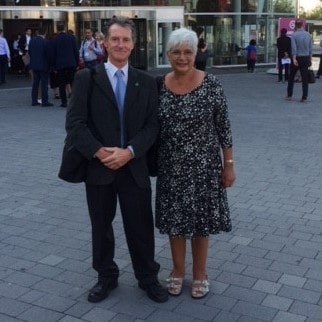Working as a couple, the Patient and the Carer, husband and wife, gives us unique opportunities to impart and share knowledge gained as advocates of Inspire2Live.
I am the patient and I have been lucky enough to have a loving husband and family. I have been cared for and I recognise the stress that my illness put upon the whole family. When I got cancer, my whole family got cancer!
Mark went home to tell our two sons that I had been given a prognosis of only three months. I was diagnosed with Stage IV colon cancer when I had been working the day before. I was told that I would never work again! That night, I stayed awake in hospital into the early hours with a tear dripping from my eyes writing goodbye letters to each of them and of course, to Mark. I wrote partly about the pride I felt in them achieving their milestones in life where I knew that I would not be present to make them feel proud.
Mark and I have recently and rightly been engaged with several projects concerning the position of the Carer. The Carer is often thrown into a role about which they have no experience. They have to be there and support the patient when often, they are in shock themselves. They have to deal with issues and emergencies when they are alone. They have to continue their own work alongside taking care of the patient, taking them to hospital appointments, keeping in touch with demanding relations and also taking over all the roles the patient was able to do before they were ill. Carers need to know that they may have rights. It is important to check on this.
It is now recognised that the Caregiver plays an essential role that relates to the recovery of the patient. However, this role can have an adverse effect on the Carer if they are left with no time to themselves. They will surely have no time for themselves! They have to plan this time into their schedule, arranging for others to step in. Looking after yourself, as a Carer, helps you to look after your patient and Carers should not feel guilty on taking time out.
As husband and wife, we were both suddenly thrown into the unknown. Paramount to my survival was gaining knowledge of new drugs and gaining access to them. This involved a political battle! Today, there is so much knowledge relating to the individual’s molecular biology that it is even harder to enter into this world.
There is also so much advice on exercise and nutrition. This can really help the patient in coping with digestion, avoiding blockages in the colon and generally, keeping as healthy as possible. Eating small meals more often is preferable for the patient.
Also, there are intimate moments when you are helping your loved one around washing and dressing. With colorectal cancer, I was lucky to have a brilliant surgeon who avoided the necessity of a stoma. This is a difficult area for most people and the lover is suddenly changed to a role of nurse without training.
Patients are being diagnosed with cancer at a younger age and this, in itself, gives rise to problems of a different type: new liaisons, pregnancy, insurance and returning to work. There are many issues where we have to continue to fight for our rights as citizens.
A patient handles their own disease in their own way. Invariably, the disease does not change their personality. The Carer has to accept the emotional reactions from the patient and respond in an understanding way. They cannot take away the pain although they feel it and feel helpless.
We need to take care of the Carer!
Barbara & Mark Moss,
Patient advocates Inspire2Live

